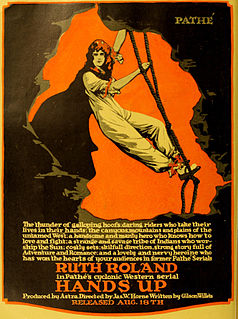
The Woman in the Web is a 1918 American drama film serial directed by Paul Hurst and David Smith. It was the 9th of 17 serials released by The Vitagraph Company of America. This World War I period serial about a Russian princess and the overthrow of the Tsar introduced the concept of the Red Menace to serials. The serial is now considered to be a lost film.

The Mystery Ship is a 1917 American adventure film serial directed by Harry Harvey and Henry MacRae. The film is considered to be lost.

The Brass Bullet is a 1918 American adventure film serial directed by Ben F. Wilson. It is now considered to be a lost film.

The Bull's Eye is a 1917 American film serial directed by James W. Horne. It is now considered to be a lost film.
The Lion's Claws is a 1918 American adventure film serial directed by Harry Harvey and Jacques Jaccard and starring Marie Walcamp and Ray Hanford. The serial, which had 18 chapters, is considered to be a lost film.

The Hidden Hand is a 1917 American film serial directed by James Vincent. This is a lost serial.

Hands Up is a lost 1918 American adventure film serial directed by Louis J. Gasnier and James W. Horne. The serial was Ruth Roland's breakthrough role.

The Brazen Beauty is a 1918 American silent comedy film directed by Tod Browning. It is not known whether the film currently survives, which suggests that it may be a lost film.

The Forbidden Path is a 1918 American silent drama film directed by J. Gordon Edwards and starring Theda Bara. The film is now considered lost.

Society for Sale is a 1918 American silent drama film directed by Frank Borzage and starring William Desmond and Gloria Swanson. It is not known whether the film currently survives, which suggests that it is a lost film.

Station Content is a 1918 American silent drama film directed by Arthur Hoyt and starring Gloria Swanson. The original, five reel feature is presumed to be lost, but a one reel abridgment created in 1926 does survive and has been released on video.
Everywoman's Husband is a 1918 American silent drama film directed by Gilbert P. Hamilton and starring Gloria Swanson. A print of the film is preserved at the UCLA Film and Television Archive.
The Man From Montana is a 1917 silent black and white film directed by George Marshall. It stars Neal Hart and George Berrell. It is not known whether the film currently survives, which suggests that it is a lost film. The film should not be confused with the 1941 film Man from Montana.

The Serpent's Tooth is a 1917 American silent drama film starring Gail Kane from the stage and released through the Mutual Film company. It is a lost film.

Rough and Ready is a 1918 American silent Western film directed by Richard Stanton and produced and distributed by the Fox Film Corporation. It stars stage actor and western hero William Farnum. The picture was filmed in the Adirondack Mountains in western New York state. It is a lost film.
The Bride's Awakening is a 1918 American silent drama film released by Universal Pictures and produced by their Bluebird production unit. Robert Z. Leonard directed the film and his then-wife Mae Murray was the star. A print of the film is housed at the EYE Institute Nederlands.

The Hell Cat is a 1918 American silent Western film produced and distributed by Goldwyn Pictures. Reginald Barker directed and Geraldine Farrar starred. It is not known whether the film currently survives.
Love Letters is a 1917 American silent drama film directed by Roy William Neill and written by Ella Stuart Carson and Shannon Fife. The film stars Dorothy Dalton, William Conklin, Dorcas Matthews, Thurston Hall, Hayward Mack, and William Hoffman. The film was released on December 24, 1917, by Paramount Pictures. A print of Love Letters is held by the Library of Congress.

The Woman Who Gave is a lost 1918 American silent melodrama film directed by Kenean Buel and starring Evelyn Nesbit, a former Gibson girl, "It girl" model and showgirl involved in a 1906 "trial of the century" that involved a killing and an allegation of rape – whose films often exploited the fame of her life story. The film was produced and distributed by the Fox Film Corporation. The film went into release the day before fighting in World War I ended.

The Gun Woman is a 1918 American silent Western film directed by Frank Borzage and starring Texas Guinan. It was produced and distributed by the Triangle Film Corporation.















